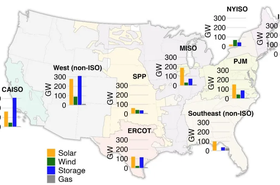The US Securities and Exchange Commission (SEC) has proposed a set of rules which would require companies to include climate risks in their statutory reports. This could mean they must declare their emissions.
Under the proposed rules, US companies with more than $25 million in assets would have to disclose information about their direct (Scope 1) and indirect (Scope 2) greenhouse gas (GHG) emissions. They could also be required to disclose the emissions of their entire upstream and downstream supply chain (Scope 3), if that figure is considered important, or if they have included Scope 3 in their emissions targets.
Microsoft last week revealed that Scope 3 emissions are hard to control: in 2021 its Scope 3 GHG output grew by 23 percent in 2021, completely dwarfing any cuts to its direct and indirect emissions.
Public scrutiny
Companies with over $25 million in assets must register with the SEC and file regular reports which declare financial and other risks. The SEC wants to add in "climate-related risks" which could impact their business, and to require climate-related statements such as carbon accounting along with audited financial statements. The SEC is adopting greenhouse gas emissions as they are a "commonly used metric" to assess a registrant’s exposure to such risks.
Accounting for environmental impact is a fraught subject, as carbon accounting standards can vary widely. Microsoft and a group of other large firms recently issued the Carbon Call, demanding consistent carbon accounting standards.
The proposal also includes climate-related goals and progress; climate transition plans; climate-related risk assessment information; and climate governance information.
“The new [proposed] climate disclosure rule is truly a watershed moment in responding to investor demand for accurate climate disclosure,” said Danielle Fugere, president and chief counsel of shareholder advocacy group As You Sow. “Clear and standardized reporting of greenhouse gas emissions is the bedrock of sound investor decision-making. The new rule provides investors with more robust, complete, and comparable disclosure of risk and the emissions data to determine which companies are aligning their business activities with Paris targets and minimizing transition risks.”
SEC chief economist Jessica Wachter said investors are currently struggling to compare information from incompatible reporting frameworks and said the rule would reduce “information asymmetry,” insider trading, and reduce investor costs by standardizing the format of environmental information.
"I am pleased to support today’s proposal because, if adopted, it would provide investors with consistent, comparable, and decision-useful information for making their investment decisions, and it would provide consistent and clear reporting obligations for issuers," said SEC Chair Gary Gensler. "Our core bargain from the 1930s is that investors get to decide which risks to take, as long as public companies provide full and fair disclosure and are truthful in those disclosures.
"Today, investors representing literally tens of trillions of dollars support climate-related disclosures because they recognize that climate risks can pose significant financial risks to companies, and investors need reliable information about climate risks to make informed investment decisions," said Gensler. "I believe the SEC has a role to play when there’s this level of demand for consistent and comparable information that may affect financial performance. Today’s proposal thus is driven by the needs of investors and issuers."
The proposed rule changes would require a registrant to explain how it is dealing with climate-related risks, how these risks have already had (or are likely to have) a material impact on its business, and how climate-related events such as severe weather will affect the business.
Reporting is likely to be closely based on the existing GHG Protocol.
Smaller companies are exempt from the proposed disclosures, and they will be phased in over time.
The proposed rules will be published on SEC.gov and the Federal Register, and will be open to comments for 30 days after publication.




